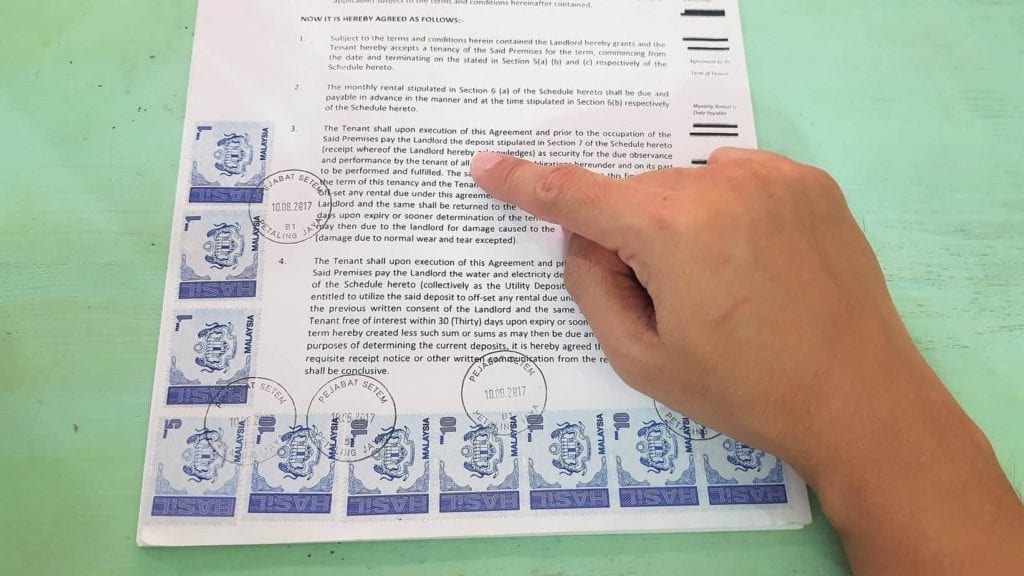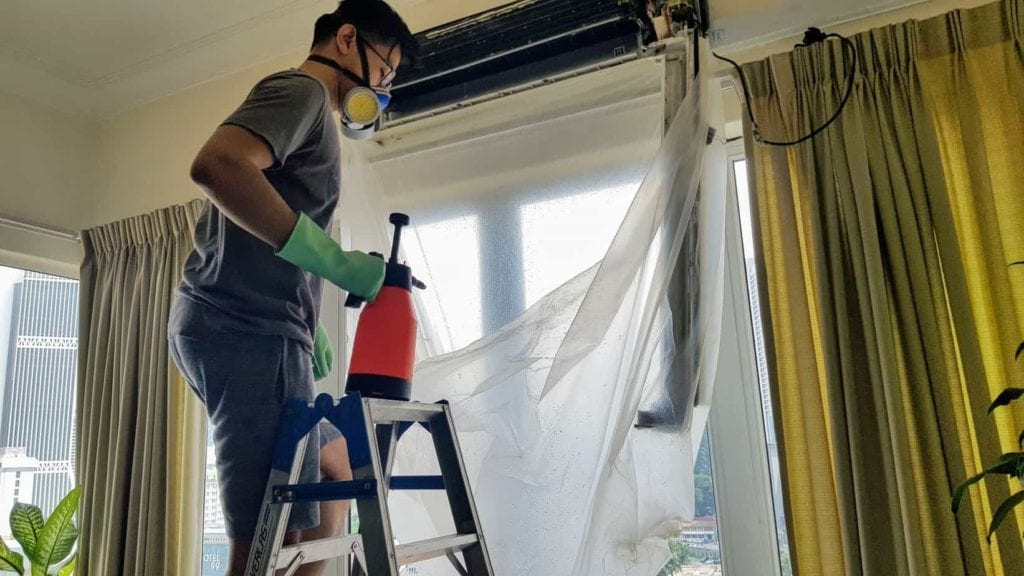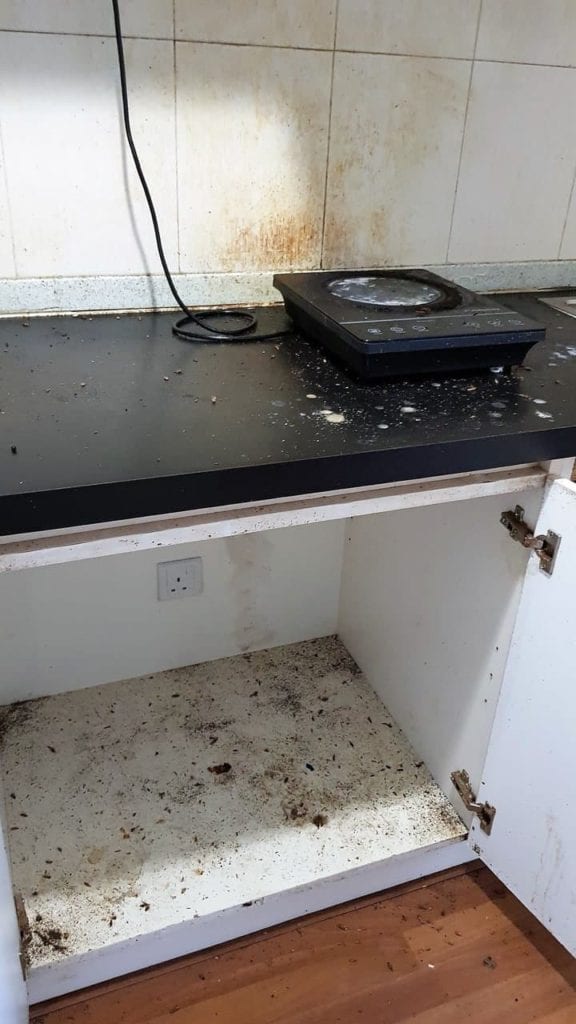Street Smarts Guide to Renting a Home in Malaysia

I own 2 properties and have rented 1 of them out to a tenant, I have also rented accumulatively 9 properties including my current home office. So I have experiences being a landlord and also a tenant. I will share with you my personal experiences of best practices, what is the tenant’s financial responsibility, what to avoid and how to sense toxic agents and landlord and when to run away as far as you can so you don’t end up in a contract with a psychopath or a scammer.
Bills that you as a Tenant have to Pay in Malaysia:
When Booking the Property:
- Security Deposit (2 months)
- Utility Deposit (1 month)
- 1-month advance rental (booking fee)
- Key Deposit (common but not compulsory, depends on the owner)
- Tenancy Agreement Stamp Duty
Bills once you have moved in:
- The following months rent
- Electricity
- Water
- Sewerage tax
- AC servicing fee (typically once every 6 months)
Additional Charges Upon Moving Out:
- AC servicing if it’s obviously too dirty
- Any abnormal damages to the property (wear and tear doesn’t count)
- Professional cleaning/ replacement of items if the condition after check out is bad
As a Tenant, should I Deal Directly with the Owner or go Through a Property Agent?
Let’s get something out of the way, in Klang Valley (Kuala Lumpur and Selangor), the tenant does not pay the agency fees, the agent will charge 100% of their fees (1 month rental) to the landlord. That being said, there is really nothing to lose for you as a possible tenant to go through an agent.
However, some cities like Johor Baru down south apparently spilits the 1 month agent fee 50-50 between the owner and the tenant. If in doubt, simply ask the agency: “who pays for your 1 month fee?”. In this case, you might want to be aware of this on top of all the deposits that you have to pay.
Regardless of going through an agent or directly to the owner, you will be dealing with a human being, that has a unique personality and character, that you inevitably have to deal with for at least a year. So apart from the points that I will be sharing below, you need to leverage on your common sense and soft skills to detect nonsense people and psychopaths.
Benefits of going through a Property Agent
- Going through an agent will usually mean being more professionally handled. You will be dealing with an agent that will represent a real estate company. So make sure you ask the agent for his agent ID and Google the company, to verify that he/she is, in fact, a real estate agent registered under that company and not an imposter.
- When you pay the deposits, it should go to the agency’s company bank account and not the agent’s personal bank account. So you can rest assure that the agent won’t be running off with your money.
- You don’t have to negotiate directly with the owner. You can demand things to be fixed or replaced to the agent before you move in and he will find a common ground between your requests and what the landlord is willing to provide. The agent’s job is to negotiate. So leave it to him/her to persuade the owner for your favor.
- You will be saving time. When you set an appointment with an agent, ask him/her to show you more than one unit. So you don’t have to waste time contacting and setting up appointments with individual owners.
- You can ask the agent on how are the owners? If any of the landlords a difficult person to deal with? If the landlord is a tough character, I will guarantee you that the agent won’t recommend the landlord to you either as the agent will have to deal with the landlord to get everything signed off. So this is a good filter to weed out psychopath landlords.
If you are unlucky however, you might be dealing with a fly-by-night agent, he/she will stop answering your calls once you have paid up all the fees. You will be left alone to deal with any disputes or complaints about your rental or landlord throughout your tenancy. So you need to do some homework on the agent:
How to Find a Good Property Agent
- Go online to any property search portal and search for the property that you want (in Malaysia, it is www.iproperty.com.my or www.propertyguru.com.my). If you keep seeing the same agent representing a lot of property listings, this means that this is the person that will be active in that area and you will have the best and the most properties to choose from.
- Alternatively, simply pay a visit to the property management office of the building that you want to stay in and ask them for an agent’s contact. The management will obviously know who is and not a good agent and will only give you the contact of the non-troublemaker.
- A good agent will always be in proximity. Preferably if they themselves live in the same property or at the very least have an office in the property. That will show you that they are serious and mean business.
- When you do finally meet him/her, first impressions count, make sure they show up dressed decently professional. It’s hard to take someone seriously if they show up in shorts and flip flops.
- Ask them for their real estate ID and Google it up. You can check if they’re a real agent or not by going to this website and keying in their agent ID. Make sure everything checks out.
- If they are elusive in answering about the company they are working for, your common sense alarm should be buzzing off the walls and you need to walk away.
- Make sure the booking and deposit money is transferred to the company account that they claim they are working for and not into their personal account.
Common Misleading Activities by Property Agents
A reader of this blog has emailed me about a common tactic that agents typically mislead prospect tenants and I think it is worth a share:
Agent’s will steal someone else’s property pictures and flood ads up on iProperty and propertyguru so they have a higher chance of someone calling them.
Once someone does call, they obviously don’t have that property in their inventory, they will tell you a lie that the one you want is not available anymore but will recommend you the ones that they actually have, which is almost always inferior to the ones they advertise.
A little white lie, but I still think it is quite annoying to be on the receiving end.
How to check if your Possible Landlord is a Psychopath
I didn’t do a background check of one of my landlords and I was stuck with a psychopath. Here are my lesson learned:
- First, meet the person and let him/her tell you the rundown of the property. Expect everything to be rosy. If the landlord seems to oversell the place and talks too much to distract you while you inspect the place – RED FLAG #1
- Ask the landlord what does he/she do for a living. If the answer is anything but straightforward – RED FLAG #2
- If the landlord tells you that he/she will get their lawyer to make the Tenancy Agreement, this is a cause for concern. Unless you are renting a multimillion-dollar factory, this seems excessive. Most Tenancy Agreements could simply be downloaded on the internet and the fact that he/she needs it to go through ‘his/her lawyer’ means that the agreement will clearly favor the landlord – RED FLAG #4
- Simply ask the landlord a hypothetical question: “If the AC stops working during the tenancy and I call you about it, what will you do?” You know that it is the landlord’s responsibility to provide a fully working property for you. An old AC that has stopped working needs to be repaired or replaced. Gauge his/her reaction.
- If the landlord mentions “I need to make a video recording of us signing the agreement to have evidence that we both agree to the Terms & Conditions”, this is the biggest red flag, you should run away as far as humanly possible. BIG RED FLAG #5
- After you have finished the viewing with the landlord, come back again when he/ she is not around and ask the Management Office, the neighbors and the property agents at the property about that particular landlord. Really gauge their reaction. You should trust your instinct if you see most people start sighing when you mention his/her name. RED FLAG #6
At this point in my life, 1 red flag is enough for me to walk away. If you experience at least 2 red flags, that’s enough reasons to run away. What you should do? GO THROUGH AN AGENT and do your homework as explained in my steps above. Now that you have done a thorough job combing through property agents, decent landlords, agreed to a rental price and move-in date, now you will proceed to sign the tenancy agreement:
Don’t be fooled by Lawyer Lingo in your Tenancy Agreement – What to look out for

You don’t need to get degree in law to understand a simple Tenancy Agreement. Let’s break down what you really need to know in the Tenancy Agreement. You can just ask the agent or the owner where in the document does it mention:
- Which clause that clearly states, what do you and what does the owner have to pay during your tenancy.
- The deposit amount and return procedures.
- What is the termination penalty in the event you are not able to fulfill your min 1 year agreement (it happens more than you think).
- The contact info of the owner so they could be easily contacted.
- Ask the agent to make a list of inventory of the appliance in the house and any defects prior to your move in. You don’t want to be charged for a pre-existing damage.
Everything checks out? The next step is to make a payment to book the property:
Bills you Have to Pay When Booking a Property
Let’s take an example, you have negotiated a price of RM2,000 a month for a 2 bedroom apartment:
[table id=2 /]
*1: Stamp Duty Calculation for 1 year:
RM1 for every RM250 of the annual rental in excess of RM2,400. In our case, annual rental is (RM2,000 x 12) = RM24,000. Amount subjected to stamp duty: RM24,000 – RM2,400 = RM21,600. Stamp duty will is (RM21,600/250) = RM86.40. Read more on this in this news artcile.
Total to be paid upon booking: RM7,284.40 upfront. That’s a lot of money, you better have solid savings!
Bills you have to Cover Once you Have Moved In:
- The following monthly rental to the owner of course
- The electricity bill (TNB)
- Water Bill (you will pay this directly to the management office)
- Your own home internet WiFi (if your agreement does not include free WiFi)
- Sewerage Tax (Indah Water). This will be billed and mailed to you every 3 months. Your local city council will determine the rate depending on the type and value of your property. My current apartment is charged at RM8 a month. You can check the rates on Indah Water’s website.
- AC servicing – You must service the AC (chemical wash) every 6 months, check your Tenancy Agreement. If it is, keep the receipt as proof.

When you are ready to move out, it is your responsibility to clean and restore the property as close to the original condition before you moved in. General wear and tear is fair game. If you didn’t do your homework to asses a psychopathic landlord, he/she will take any opportunity to charge you for everything:
Additional Charges Upon Moving Out:
- Just be a normal civilized human being and clean up after yourself. If you leave the house messy, the landlord might charge you for cleaning as most are too busy to clean themselves.
- Don’t live like an animal. I have seen a disgusting neighbor move out and left the house infested with cockroaches and bedbugs, the owner had to call in an exterminator and buy a brand new bed. You will be charged for all of this.
- You must service the AC (chemical cleaning) before you leave. Since it is required for you to service it every 6 months (check your Tenancy Agreement), time the last one just before you move out so when the landlord comes to do an inspection upon check out, the AC is still sparkling clean. Otherwise, you might be charged for it.

Summing it all up
I hope this article that is based on my personal experiences and written in plain English which will help you to ease your transition into living in Kuala Lumpur.





![[Airbnb Business]: How to Analyze Your Competitors Before Starting](https://helmihasan.com/wp-content/uploads/2020/07/analyze-your-airbnb-competitors-1-768x512.jpg)
